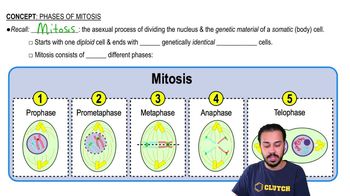Here are the essential concepts you must grasp in order to answer the question correctly.
Mitosis
Mitosis is a type of cell division that results in two genetically identical daughter cells from a single parent cell. It is a crucial process for growth, development, and tissue repair in multicellular organisms. Mitosis consists of several stages: prophase, metaphase, anaphase, and telophase, followed by cytokinesis, which divides the cytoplasm.
Recommended video:
Genetic Identity
During mitosis, the daughter cells produced are exact genetic copies of the parent cell, meaning they have the same number of chromosomes and identical DNA sequences. This genetic consistency is vital for maintaining the organism's genetic integrity and ensuring that all cells function properly. Any errors in this process can lead to mutations or diseases, including cancer.
Recommended video:
Cell Types and Mitosis
Mitosis occurs in somatic (non-reproductive) cells throughout the body, not just in specific types like skin cells or cancerous cells. It is essential for normal growth and repair processes in tissues. In contrast, meiosis is the type of cell division that produces gametes (sperm and eggs) and results in genetic diversity.
Recommended video:
 Verified step by step guidance
Verified step by step guidance


